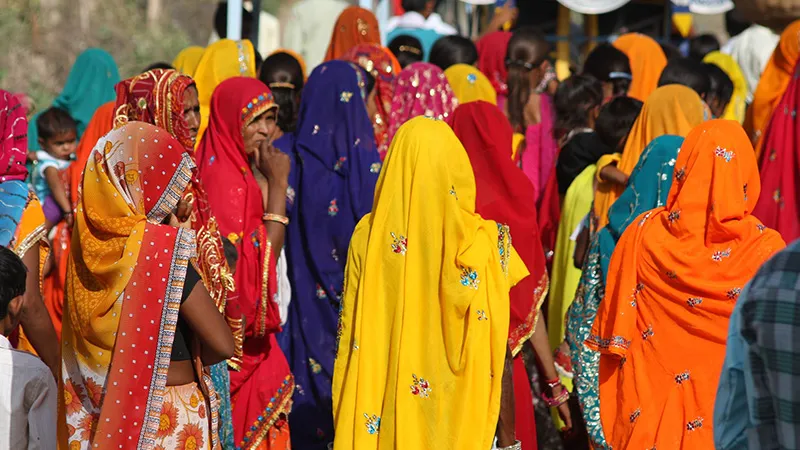-
CENTRES
Progammes & Centres
Location

It is not often discussed in India that there was a time, not too far into the past, when the doctors from the famous All India Institute of Medical Sciences (AIIMS) performed and promoted sex-selective abortions as an effective and ethical method to address India’s population problem. Some of them even suggested that “the couple keeps on reproducing just to have a son”, and prenatal determination of sex would put an end to this “unnecessary fecundity”.
After sex selective abortions got too big a problem to ignore, the government banned the practice, although never enforced the ban properly. It is said that western agencies knowingly poured money into the programme that introduced technology using which female foetuses were aborted in the name of population control.
The flagship campaign of the Union Government’s ministry of Women and Child Development (WCD), named Beti Bachao Beti Padhao (BBBP or Save daughter, Educate daughter) is trying now to address a declining child sex ratio -- 919 females per thousand males in 2011-- by focusing on the worst-performing states across the country. Earlier this month, the ministry announced a substantial expansion of the scheme, now covering one-fourth of the country. Revitalising the implementation of the Pre-Conception & Pre-natal Diagnostic Techniques (PCPNDT) Act which prohibits doctors from telling parents the sex of a foetus is a main component of BBBP. However, in the last decade, only 206 doctors have been convicted by courts across the country under the Act.
Given this background, it was quite startling that at the event announcing the expansion of BBBP, the Union WCD Minister made a proposal that finding out the sex of the foetus must be made mandatory instead. Interestingly, the minister also equated institutional deliveries to safe deliveries and said that home deliveries pose a threat to the newborn as there might be an attempt on its life. Given the overall context, there was a wide sense of disbelief that the minister made this proposal.
The Indian Medical Association (IMA) was quick to support this proposal. But a former member of the Planning Commission, who had mooted a similar suggestion in the past, spoke out against it, saying that policing a woman’s body is intrusive and harmful. The minister later clarified that she was making a suggestion, meant only to trigger debate. However, since then, many stakeholders such as the National Commission for Women (NCW) seem to be supportive of mandatory testing.
Criticisms to the proposal
Apart from the issues of privacy and body autonomy, there are other issues at hand which need discussion. The proposal absolves the medical community of all responsibility and unfairly puts the onus on the pregnant woman. There will be tremendous pressure on many women to get rid of the pregnancy, once the gender is known. Many point out that such a proposal will also criminalise pregnant women who already bear the brunt of gender discrimination in our society.
Civil society groups have argued that it is possible that many women who need an abortion for medical reasons would find themselves being denied these services. According to a joint statement, such a policy will move back into an era where vigilante behaviour was encouraged and women’s bodies and lives were not in their control. If surveillance is imposed on pregnant women where the state and the family can potentially have diametrically opposite objectives, a lot of things may go wrong.
Currently, India’s thriving illegal sonography market specialises in locating and getting rid of unwanted daughters, unfortunately at the families’ request – where women may not have much say. News stories suggest that India’s preference for sons result in situations that can be bizarre. Some of the service providers reportedly con the “customers” by falsely passing off the male foetus as a female one so that they can recommend an abortion, making some quick money as commission.
Interestingly, India already has a fledgling Mother and Child Tracking System (MCTS) which tracks maternal and child health information (not the sex of the foetus), with the aim of improving service delivery planning and outcomes. MCTS can potentially play a major role in India’s monitoring of Sustainable Development Goals (SDGs), as it covers the whole country, and the data quality has been slowly improving. The introduction of mandatory sex determination in the system could potentially undo the slow achievements of the country’s administrative health data systems in one go.
The introduction of mandatory sex determination may discourage registration into the MCTS early on, since many families will now prefer to enter the system only if they are sure about the sex of the foetus. Given the state of healthcare regulation in India, voluntary tests can easily be done before mandatory ones, particularly when doctors and ultrasound technicians are not held responsible. India’s record of antenatal care coverage is quite bad, still we had twenty three million pregnant women registered in antenatal care (ANC) according to official data, which explains why the industry is excited about the idea of mandatory testing. They will be making money out of not just the official test, but the “unofficial” ones as well.
Debate around the minister’s proposal
Interestingly, some of the criticisms too looked problematic as the proposal itself. “If you inform the women about the unborn child’s gender, it may be okay for the educated and informed class of women,” says the head of Women’s Power Connect, a pan-India organisation. “But for a large number of women living in rural areas, who adhere to the cultural and social norms that favour a male child, it can prove counterproductive”, she says.
It may be a widely held view, but are educated families really less biased against a girl child? Not necessarily. Contrary to popular perception, educated parents are biased against the girl child too, and in disturbingly large numbers. Researchers have shown that graduate parents had a dismal sex ratio at birth of 813, while in the case of post graduate parents, it was worse at 769. Ironically, the best Sex Ratio at Birth (SRB) of 933 was in cases where both parents were educated only up to middle school or less. Latest Census figures show that female literacy rates and child sex ratio are in fact inversely linked, across social groups.
Equally concerning is the usage of the term “foeticide” instead of “sex selective abortions” by actors from both sides of the debate. According to experts, even government posters for awareness generation of the public with respect to sex determination use the terminology of “foeticide” rather than “abortion” – a term that indicates a homicidal criminal activity of taking a life. As activists observe, the term “foeticide”, while emotive from a public engagement point of view, veers dangerously close to an anti-abortion position itself.
India’s complex social reality often presents additional challenges to policymakers. While it is important to think through policy suggestions with wide implications at multi-stakeholder platforms, the proposal of a mandatory sex determination test does not seem to pass muster.
The views expressed above belong to the author(s). ORF research and analyses now available on Telegram! Click here to access our curated content — blogs, longforms and interviews.

Oommen C. Kurian is Senior Fellow and Head of Health Initiative at ORF. He studies Indias health sector reforms within the broad context of the ...
Read More +